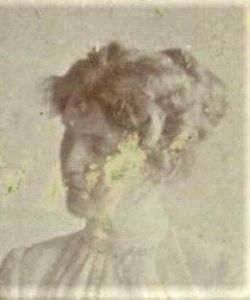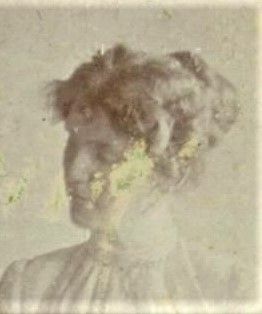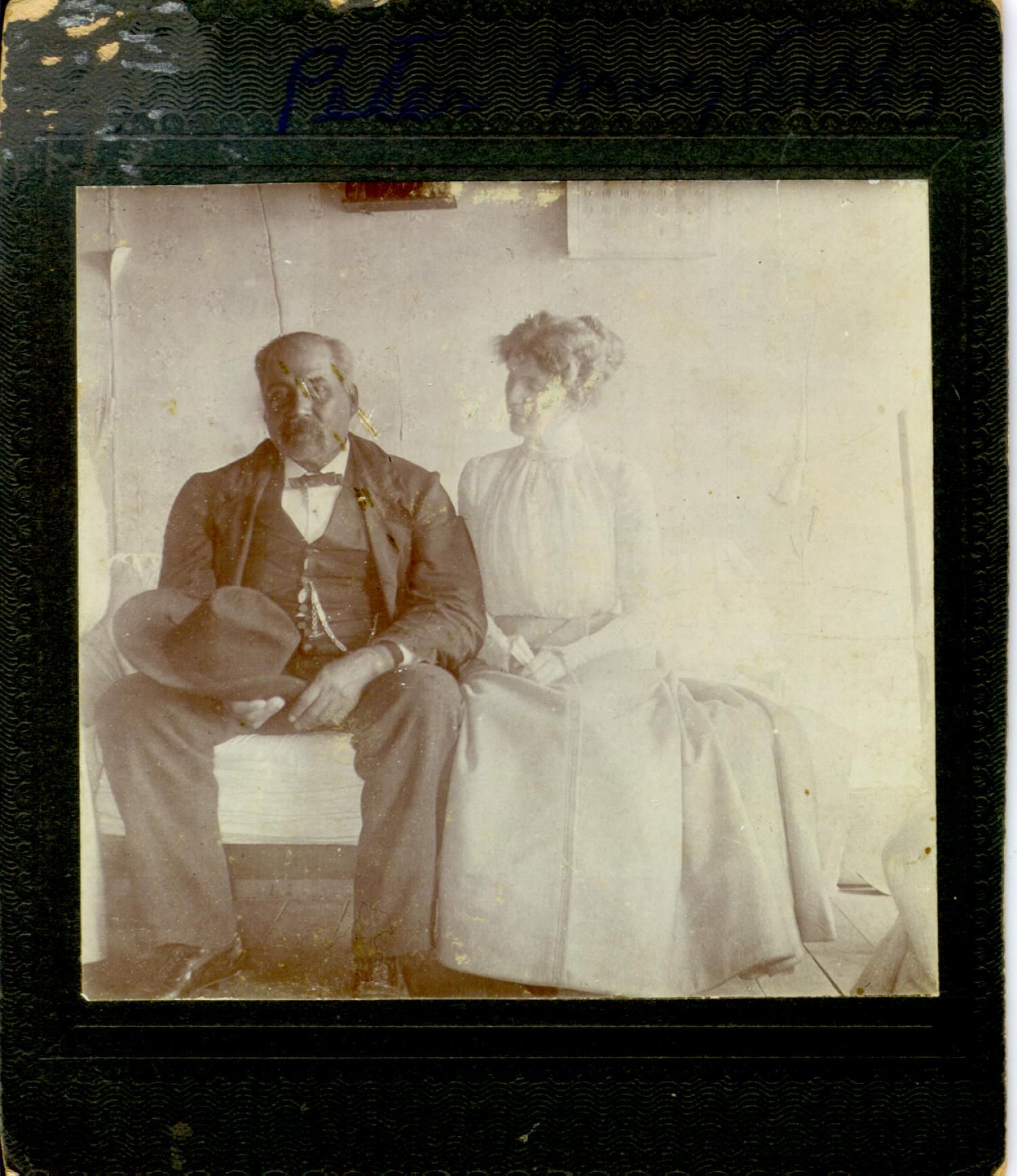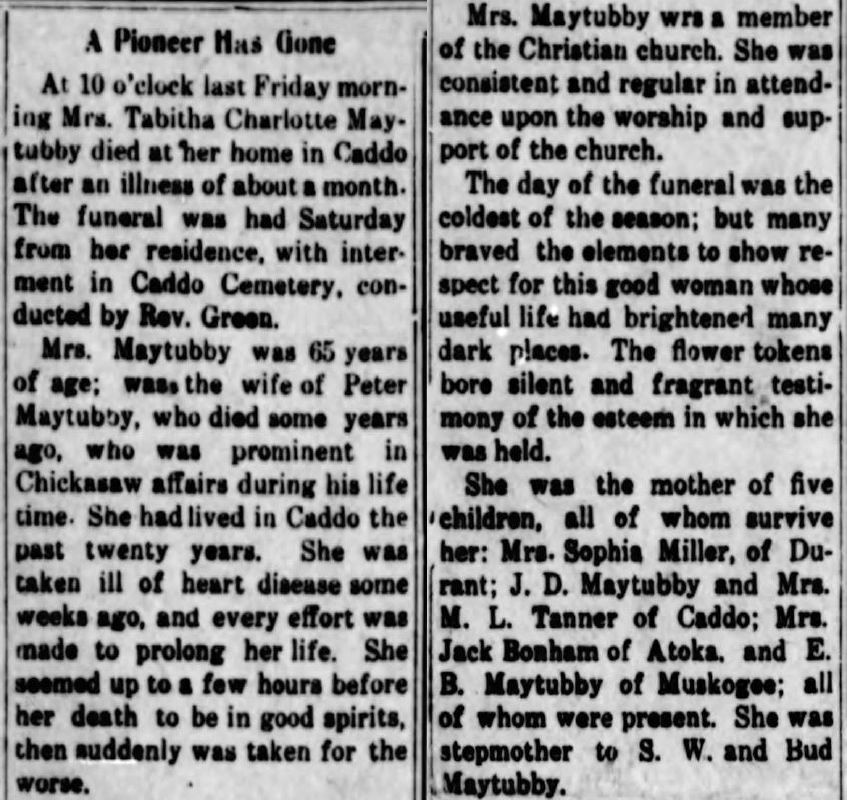____________________________________________________________
Tabitha Bailey was the daughter of William and Minerva Hinnard Bailey of Walker Co., GA. The 1860 US census of Pond Spring, Walker Co., GA showed this family:
William Bailey 37/GA
Manervy Bailey 33/GA (nee' Minerva Hinnard)
Susan Bailey 15/GA
William Bailey 13/GA (William Cicero Bailey)
Elizabeth Bailey 11/GA
Martha Bailey 9/GA
Tabitha Bailey 5/GA (mar. Peter Maytubby)
Charles Bailey 1/GA
The parents and several of the children died in the early 1860's during the Civil War, as described in the July 1925 edition of the Walker County Messenger:
"Bailey Family: W.C. Bailey and sisters, Tabitha and Elizabeth, were raised by a family named Brooks after their parents died. Their parents owned a large farm in the Cove. W.C. Bailey (1846-1931) married Hannah Childress (1849-1905) and they lived on the road to the Old Bethel Church. Elizabeth Bailey married George W. Owings, son of John Owings. Tabitha Bailey moved to Arkansas where she met and married Indian Chief Maytubby. He was a Judge from Oklahoma. A son of theirs was the clerk of Muscogee County."
In the 1910 US census of Bryan County, Oklahoma, Tabitha Maytubby shows born 1856 in Georgia and reports that both parents were born in Georgia. She reports this same information in the 1920 census.
Tabitha died two days before Christmas, 23 December 1921 in Caddo, Bryan County, Oklahoma. She was buried in Kenefic, OK at Maytubby Springs Cemetery next to her husband, Peter Maytubby.
Biography of Peter Maytubby from Chickasaw Nation:
Peter Maytubby was born in Mississippi in 1837 and moved to Indian Territory with other tribes who migrated at the time. Maytubby was a full-blooded Chickasaw Indian and served as a Captain for the Confederate Army in the Civil War.
After the war ended, Captain Maytubby returned to his home to resume life as a farmer and cattle rancher. He was always involved with the people of his tribe. Maytubby was never too busy to lend a helping hand or be a part of a committee for the Chickasaw Nation.
He was a member of the Dawes Commission, and with his extensive knowledge of the Chickasaws, was a liaison to the U.S. government to help find fraudulent claims of Chickasaw citizenship.
He was the last elected governor of the Chickasaw Nation in 1906.
Accomplishments:
Interpreter for the U.S. government and the Chickasaw Nation.
Last elected governor of the Chickasaw Nation.
MANNING v. MAYTUBBY
1914 OK 297
141 P. 781
42 Okla. 414
Case Number: 3486
Decided: 06/23/1914
Supreme Court of Oklahoma
MANNING, Adm.,
v.
MAYTUBBY.
Syllabus
¶0 1. TROVER AND CONVERSION--General Denial--Evidence--Gift Inter Vivos. In an action of conversion, any evidence is admissible under a general denial which tends to disprove the allegations of plaintiff's petition, and it is not necessary, under section 5634, Comp. Laws 1909 (Rev. Laws 1910, sec. 4745), to specially plead that the property alleged to have been converted was given to defendant during the lifetime of the deceased, as said gift tends to disprove a conversion.
2. EVIDENCE--Witnesses--Admissibility-- Transactions with Deceased. Evidence examined, and its admission held not to be prejudicial error.
3. GIFTS--"Gift Inter Vivos"--Requisites. A "gift inter vivos" of real and personal property is complete when there is an intention to give, accompanied by a delivery of the thing given, and an acceptance by the donee.
Error from District Court, Bryan County; A. H. Ferguson, Judge.
Action by A. F. Manning, special administrator of the estate of Peter Maytubby, deceased, against Tabitha Maytubby. Judgment for defendant, and plaintiff brings error. Affirmed.
McPherren & Cochran, for plaintiff in error
Sol J. Homer, for defendant in error
RITTENHOUSE, C.
¶1 This is an action of conversion praying for judgment in the sum of $ 10,000 on the first count and $ 2,250 on the second count. The petition alleges that Peter Maytubby died, in what is now Atoka county, Okla., on the 1st day of May, 1907, leaving an estate valued at $ 20,000, consisting of land, money, and other personal property; that Tabitha Maytubby (Mrs. Peter Maytubby), defendant, was appointed administratrix of the estate, and on the 23d day of July, 1908, her letters were revoked, and afterwards the plaintiff was appointed special administrator of said estate, and instituted this suit asking for judgment in the sum of $ 10,000 on the first count, on the ground that the said defendant held for Peter Maytubby the sum of $ 6,093.86, being on deposit in her name in the State National Bank of Denison, Tex.; $ 1,500 in her name in the National Bank of Denison, Tex., and the balance of said $ 10,000 in her name in the Choctaw National Bank and Caddo National Bank, both of Caddo, Ind. T., now Oklahoma; that said money remained the property of the said Peter Maytubby at the time of his death; that the defendant refused to inventory said money as a part of the estate and withdrew said deposits and converted same to her own use. The second count alleges that Peter Maytubby while residing at Tishomingo, Ind. T., caused to be built upon the east half of the north 19.34 acres of lot 1, section 4, township 4 south, range 6 east, a certain dwelling house, in which the said Peter Maytubby and family would reside at times, but which was not the homestead of the family; that said land was a portion of the allotment of J. S. Maytubby, a Chickasaw Indian; that no deed was executed to Peter Maytubby, although the purchase price had been paid by the said Peter Maytubby; that after the appointment of Tabitha Maytubby (Mrs. Peter Maytubby) as administratrix, she caused J. S. Maytubby to sell the said land to John J. and Lovie Stobaugh for $ 2,250, and that she converted said money to her own use. To this petition was filed a general denial to each count. No affirmative or special defense was pleaded.
¶2 The defendant offered in evidence, as a defense to the allegation of a wrongful conversion contained in plaintiff's petition, that she was the absolute owner of said real and personal property by gift inter vivos from Peter Maytubby. There is nothing in the record which would indicate that creditors were interested in the litigation, but the controversy seems to be between the widow and a stepson. The plaintiff contends that the plea of a gift inter vivos as a defense in an action of conversion is a special defense under section 5364, Comp. Laws 1909 (Rev. Laws 1910, sec. 4745), and must be specially pleaded. We cannot agree with this contention. The evidence showing a gift tends to disprove the allegation of a conversion, which allegation is the gist of plaintiff's action, and one that plaintiff was required to prove. If defendant was the owner of the property alleged to have been converted, her ownership could be proven under a general denial. It was held in Hopkins v. Dipert, 11 Okla. 630, 69 P. 883, that in an action of conversion the denial of plaintiff's ownership would allow the defendant to prove the ownership in any other person, and that before the plaintiff could recover under her petition, she must prove that she was the owner of the property, and the defendant, in order to show that she was not the owner, might show that some one else was the owner. See, also, McGrew v. Armstrong, 5 Kan. 284; Bridges v. Paige, 13 Cal. 640; Jones v. Fruin, 26 Neb. 76, 42 N.W. 283; Johnson v. Pennell et al., 67 Iowa 669, 25 N.W. 874; Griffin, Receiver, v. Long Island Railroad Co., 101 N.Y. 348, 4 N.E. 740; Bliss on Code Pleading (3d Ed.) sec 325 et seq.
¶3 The next assignment of error is that the court erred in admitting the pass books of the several banks in evidence without identification by the party making the entries. The evidence shows that, Jesse Maytubby was present when the bank books were delivered by Peter Maytubby to the defendant, and he testified to such delivery and identified the general character of the bank books, showing at the time that he was engaged in the banking business and qualified to testify as to the nature and character of the bank books delivered. The plaintiff alleged in his petition the name and address of each bank in which there was a deposit, the amount of the deposit, and that the deposits were made in the name of Mrs. Peter Maytubby, and these allegations were not in controversy at the trial. The only purpose, therefore, for which the bank books were introduced was to show possession on the part of the defendant, and they were properly admitted in evidence for that purpose. It is further contended by the plaintiff in error under this assignment that to allow the defendant to testify that she had these bank books in her possession for a certain period of time was a violation of section 5841, Comp. Laws 1909. (Rev. Laws 1910, sec. 5049), for the reason that said testimony indirectly related to transactions and communications had personally by the defendant with a deceased person, which was prohibited by said section. The testimony as to the length of time of possession does not come within the prohibition of this section, nor are the authorities cited in point. The deposits were in the name of the defendant, and she had a right to testify as to the length of time she was in possession of said bank books, after having shown by Jesse Maytubby the delivery of the same by the deceased, and such testimony was not in respect to a transaction or communication had with a deceased person directly or indirectly.
¶4 We come now to the main question in this action, and that is whether under the evidence the defendant has proven a gift of the real and personal property alleged to have been converted. That a gift inter vivos of real and personal property can be made has been decided in the case of Farrell v. Puthoff, 13 Okla. 159, 74 P. 96. See, also, Apache State Bank v. Daniels, 32 Okla. 121, 121 P. 237, 40 L.R.A. (N. S.) 901, Ann. Cas. 1914 A, 510, and cases cited. A gift inter vivos is complete when there is an intention to give accompanied by the delivery of the thing given and an acceptance by the donee. In this case the evidence shows that the $ 10,000 was deposited in the name of Mrs. Peter Maytubby by her husband, Peter Maytubby, and the bank books delivered to and accepted by her. Witness Jesse Maytubby testified to certain declarations of Peter Maytubby, showing an intention on the part of Peter Maytubby to make a gift of his property to his wife, and that after this conversation the deposits were made and the bank books delivered. Plaintiff further testified that she had kept possession of said bank books from the year 1905 to the date of the trial. The testimony relating to the gift of real estate is equally as strong as that of the deposits, the evidence showing that the deceased purchased the property for his wife and ordered the deed made in her name, and that afterwards she went into possession of said premises, and that valuable improvements were made. While the evidence supporting this judgment is not strong, yet the fact of a gift need not be positively proven; it may be inferred from circumstances; and, as the question of a gift inter vivos was submitted to the jury, and a verdict rendered in favor of defendant, upon an examination of the whole record we are convinced that there is testimony reasonably tending to support the verdict of the jury, and the cause should therefore be affirmed.
¶5 By the Court: It is so ordered.
____________________________________________________________
____________________________________________________________
Tabitha Bailey was the daughter of William and Minerva Hinnard Bailey of Walker Co., GA. The 1860 US census of Pond Spring, Walker Co., GA showed this family:
William Bailey 37/GA
Manervy Bailey 33/GA (nee' Minerva Hinnard)
Susan Bailey 15/GA
William Bailey 13/GA (William Cicero Bailey)
Elizabeth Bailey 11/GA
Martha Bailey 9/GA
Tabitha Bailey 5/GA (mar. Peter Maytubby)
Charles Bailey 1/GA
The parents and several of the children died in the early 1860's during the Civil War, as described in the July 1925 edition of the Walker County Messenger:
"Bailey Family: W.C. Bailey and sisters, Tabitha and Elizabeth, were raised by a family named Brooks after their parents died. Their parents owned a large farm in the Cove. W.C. Bailey (1846-1931) married Hannah Childress (1849-1905) and they lived on the road to the Old Bethel Church. Elizabeth Bailey married George W. Owings, son of John Owings. Tabitha Bailey moved to Arkansas where she met and married Indian Chief Maytubby. He was a Judge from Oklahoma. A son of theirs was the clerk of Muscogee County."
In the 1910 US census of Bryan County, Oklahoma, Tabitha Maytubby shows born 1856 in Georgia and reports that both parents were born in Georgia. She reports this same information in the 1920 census.
Tabitha died two days before Christmas, 23 December 1921 in Caddo, Bryan County, Oklahoma. She was buried in Kenefic, OK at Maytubby Springs Cemetery next to her husband, Peter Maytubby.
Biography of Peter Maytubby from Chickasaw Nation:
Peter Maytubby was born in Mississippi in 1837 and moved to Indian Territory with other tribes who migrated at the time. Maytubby was a full-blooded Chickasaw Indian and served as a Captain for the Confederate Army in the Civil War.
After the war ended, Captain Maytubby returned to his home to resume life as a farmer and cattle rancher. He was always involved with the people of his tribe. Maytubby was never too busy to lend a helping hand or be a part of a committee for the Chickasaw Nation.
He was a member of the Dawes Commission, and with his extensive knowledge of the Chickasaws, was a liaison to the U.S. government to help find fraudulent claims of Chickasaw citizenship.
He was the last elected governor of the Chickasaw Nation in 1906.
Accomplishments:
Interpreter for the U.S. government and the Chickasaw Nation.
Last elected governor of the Chickasaw Nation.
MANNING v. MAYTUBBY
1914 OK 297
141 P. 781
42 Okla. 414
Case Number: 3486
Decided: 06/23/1914
Supreme Court of Oklahoma
MANNING, Adm.,
v.
MAYTUBBY.
Syllabus
¶0 1. TROVER AND CONVERSION--General Denial--Evidence--Gift Inter Vivos. In an action of conversion, any evidence is admissible under a general denial which tends to disprove the allegations of plaintiff's petition, and it is not necessary, under section 5634, Comp. Laws 1909 (Rev. Laws 1910, sec. 4745), to specially plead that the property alleged to have been converted was given to defendant during the lifetime of the deceased, as said gift tends to disprove a conversion.
2. EVIDENCE--Witnesses--Admissibility-- Transactions with Deceased. Evidence examined, and its admission held not to be prejudicial error.
3. GIFTS--"Gift Inter Vivos"--Requisites. A "gift inter vivos" of real and personal property is complete when there is an intention to give, accompanied by a delivery of the thing given, and an acceptance by the donee.
Error from District Court, Bryan County; A. H. Ferguson, Judge.
Action by A. F. Manning, special administrator of the estate of Peter Maytubby, deceased, against Tabitha Maytubby. Judgment for defendant, and plaintiff brings error. Affirmed.
McPherren & Cochran, for plaintiff in error
Sol J. Homer, for defendant in error
RITTENHOUSE, C.
¶1 This is an action of conversion praying for judgment in the sum of $ 10,000 on the first count and $ 2,250 on the second count. The petition alleges that Peter Maytubby died, in what is now Atoka county, Okla., on the 1st day of May, 1907, leaving an estate valued at $ 20,000, consisting of land, money, and other personal property; that Tabitha Maytubby (Mrs. Peter Maytubby), defendant, was appointed administratrix of the estate, and on the 23d day of July, 1908, her letters were revoked, and afterwards the plaintiff was appointed special administrator of said estate, and instituted this suit asking for judgment in the sum of $ 10,000 on the first count, on the ground that the said defendant held for Peter Maytubby the sum of $ 6,093.86, being on deposit in her name in the State National Bank of Denison, Tex.; $ 1,500 in her name in the National Bank of Denison, Tex., and the balance of said $ 10,000 in her name in the Choctaw National Bank and Caddo National Bank, both of Caddo, Ind. T., now Oklahoma; that said money remained the property of the said Peter Maytubby at the time of his death; that the defendant refused to inventory said money as a part of the estate and withdrew said deposits and converted same to her own use. The second count alleges that Peter Maytubby while residing at Tishomingo, Ind. T., caused to be built upon the east half of the north 19.34 acres of lot 1, section 4, township 4 south, range 6 east, a certain dwelling house, in which the said Peter Maytubby and family would reside at times, but which was not the homestead of the family; that said land was a portion of the allotment of J. S. Maytubby, a Chickasaw Indian; that no deed was executed to Peter Maytubby, although the purchase price had been paid by the said Peter Maytubby; that after the appointment of Tabitha Maytubby (Mrs. Peter Maytubby) as administratrix, she caused J. S. Maytubby to sell the said land to John J. and Lovie Stobaugh for $ 2,250, and that she converted said money to her own use. To this petition was filed a general denial to each count. No affirmative or special defense was pleaded.
¶2 The defendant offered in evidence, as a defense to the allegation of a wrongful conversion contained in plaintiff's petition, that she was the absolute owner of said real and personal property by gift inter vivos from Peter Maytubby. There is nothing in the record which would indicate that creditors were interested in the litigation, but the controversy seems to be between the widow and a stepson. The plaintiff contends that the plea of a gift inter vivos as a defense in an action of conversion is a special defense under section 5364, Comp. Laws 1909 (Rev. Laws 1910, sec. 4745), and must be specially pleaded. We cannot agree with this contention. The evidence showing a gift tends to disprove the allegation of a conversion, which allegation is the gist of plaintiff's action, and one that plaintiff was required to prove. If defendant was the owner of the property alleged to have been converted, her ownership could be proven under a general denial. It was held in Hopkins v. Dipert, 11 Okla. 630, 69 P. 883, that in an action of conversion the denial of plaintiff's ownership would allow the defendant to prove the ownership in any other person, and that before the plaintiff could recover under her petition, she must prove that she was the owner of the property, and the defendant, in order to show that she was not the owner, might show that some one else was the owner. See, also, McGrew v. Armstrong, 5 Kan. 284; Bridges v. Paige, 13 Cal. 640; Jones v. Fruin, 26 Neb. 76, 42 N.W. 283; Johnson v. Pennell et al., 67 Iowa 669, 25 N.W. 874; Griffin, Receiver, v. Long Island Railroad Co., 101 N.Y. 348, 4 N.E. 740; Bliss on Code Pleading (3d Ed.) sec 325 et seq.
¶3 The next assignment of error is that the court erred in admitting the pass books of the several banks in evidence without identification by the party making the entries. The evidence shows that, Jesse Maytubby was present when the bank books were delivered by Peter Maytubby to the defendant, and he testified to such delivery and identified the general character of the bank books, showing at the time that he was engaged in the banking business and qualified to testify as to the nature and character of the bank books delivered. The plaintiff alleged in his petition the name and address of each bank in which there was a deposit, the amount of the deposit, and that the deposits were made in the name of Mrs. Peter Maytubby, and these allegations were not in controversy at the trial. The only purpose, therefore, for which the bank books were introduced was to show possession on the part of the defendant, and they were properly admitted in evidence for that purpose. It is further contended by the plaintiff in error under this assignment that to allow the defendant to testify that she had these bank books in her possession for a certain period of time was a violation of section 5841, Comp. Laws 1909. (Rev. Laws 1910, sec. 5049), for the reason that said testimony indirectly related to transactions and communications had personally by the defendant with a deceased person, which was prohibited by said section. The testimony as to the length of time of possession does not come within the prohibition of this section, nor are the authorities cited in point. The deposits were in the name of the defendant, and she had a right to testify as to the length of time she was in possession of said bank books, after having shown by Jesse Maytubby the delivery of the same by the deceased, and such testimony was not in respect to a transaction or communication had with a deceased person directly or indirectly.
¶4 We come now to the main question in this action, and that is whether under the evidence the defendant has proven a gift of the real and personal property alleged to have been converted. That a gift inter vivos of real and personal property can be made has been decided in the case of Farrell v. Puthoff, 13 Okla. 159, 74 P. 96. See, also, Apache State Bank v. Daniels, 32 Okla. 121, 121 P. 237, 40 L.R.A. (N. S.) 901, Ann. Cas. 1914 A, 510, and cases cited. A gift inter vivos is complete when there is an intention to give accompanied by the delivery of the thing given and an acceptance by the donee. In this case the evidence shows that the $ 10,000 was deposited in the name of Mrs. Peter Maytubby by her husband, Peter Maytubby, and the bank books delivered to and accepted by her. Witness Jesse Maytubby testified to certain declarations of Peter Maytubby, showing an intention on the part of Peter Maytubby to make a gift of his property to his wife, and that after this conversation the deposits were made and the bank books delivered. Plaintiff further testified that she had kept possession of said bank books from the year 1905 to the date of the trial. The testimony relating to the gift of real estate is equally as strong as that of the deposits, the evidence showing that the deceased purchased the property for his wife and ordered the deed made in her name, and that afterwards she went into possession of said premises, and that valuable improvements were made. While the evidence supporting this judgment is not strong, yet the fact of a gift need not be positively proven; it may be inferred from circumstances; and, as the question of a gift inter vivos was submitted to the jury, and a verdict rendered in favor of defendant, upon an examination of the whole record we are convinced that there is testimony reasonably tending to support the verdict of the jury, and the cause should therefore be affirmed.
¶5 By the Court: It is so ordered.
____________________________________________________________
Family Members
Sponsored by Ancestry
Advertisement
Records on Ancestry
Advertisement















